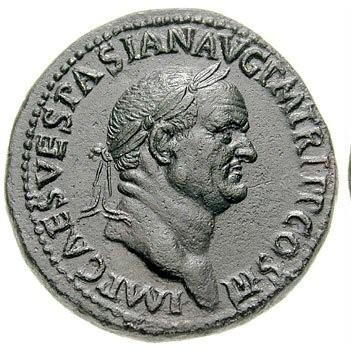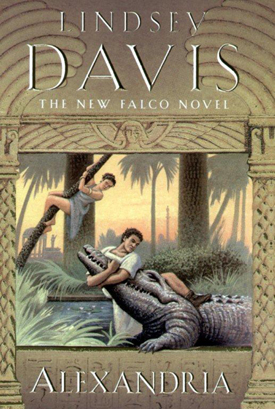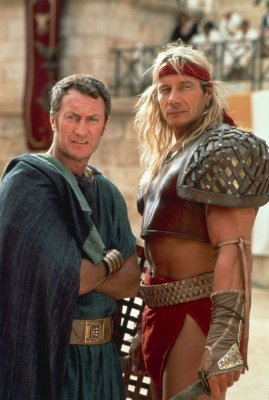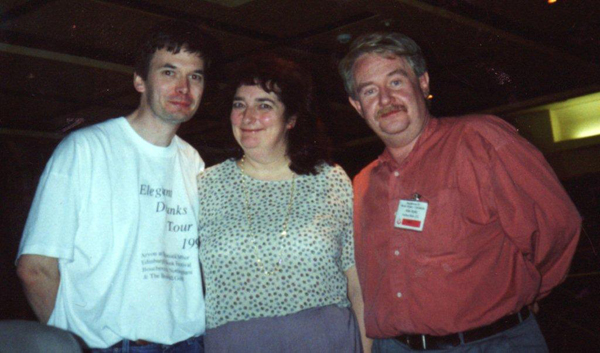|
Back in
1990, the then Literary Editor of the Daily Mirror, George Thaw, showed
me a book and said: “Read the first line and you’ll be hooked. You’ll love this,
it’s Sam Spade in Ancient Rome.”
The book he showed me – George often showed people books, he never loaned
them - was The Silver Pigs by an author I had never heard of,
Lindsey Davis. George Thaw was right about me being hooked from the first line
though; and I began to follow the adventures of Marcus Didius Falco, if not
historically the first, certainly one of the funniest and most humane private
eyes ever to slap a sandaled foot on a mean street.
As I discovered Falco, I also got to know Lindsey Davis, meeting at crime
writing conventions and parties and even going to prison together once (HMP
Belmarsh), but after giving a talk in the prison library they let us out. And
amazingly, it is now 20 years since Falco’s debut and I am still mystified as to
why The Silver Pigs did not win the John Creasey Award for best
first novel.
Awards, high praise and sales across more territories than even the Romans
controlled have, however, followed and so, on Falco’s twentieth birthday and
with a nineteenth novel about to hit the bookshops, it seemed the ideal time to
chat with Falco’s creator.
MR:
When you started Falco on his career, did you plan or ever envisage it would
stretch over two decades and nineteen novels (with a twentieth in the pipeline)?
LD:
No, it's rather amazing! I had only published romantic serials when I started
and dared not look beyond the first book (of course, if I had, it might not have
been necessary to pull the 'back from the dead' stunt with Helena's
ex-husband...) In fact I very rarely look beyond one book ahead, although the 20th
will bring at least one long-running plotline to a head. I suspected that if
people took to this idea they would go for it in a big way, and I was right to
trust my audience.
MR:
Marcus Didius Falco made his entrance with the famous (if often misquoted)
line:
When
the girl came rushing up the steps, I decided she was wearing far too
many clothes; which has a distinct echo of Raymond Chandler. Was
Chandler an influence on your decision to go down the ‘history-mystery’ route
into crime fiction? Were you a fan of crime fiction?
 LD:
I can still
remember what I was wearing when that line came to me in Tottenham Court Road
tube station – a Damart vest too many...
LD:
I can still
remember what I was wearing when that line came to me in Tottenham Court Road
tube station – a Damart vest too many...
I was
primarily keen on historical novels, but had always read, and (NB) heard on the
radio, detective stories.
Chandler's writing style appeals to me – apparently laconic but in fact quite
decorated with similes and metaphors; I thought it would fit a Roman tough guy
with an intellectual side, though you are right, it is only an echo. My writing
and Falco's character are all my own. I don't approve of writers who 'continue'
someone else's novels. Falco never was Marlow in sandals. People often think I
was following Ellis Peters too, though I hadn't read Cadfael then. I always
stress that I set out to write something nobody else was doing. Inventing your
own stuff is just so much fun.
MR:
You’ve said that Falco sprang out of your research into Flavian Rome [the
period 69-96 AD] for a non-crime historical novel. Was this The Course of
Honour and was it your first completed novel, even though not published
until 1997?
LD:
Yes, 'The Course of Honour', which is the true love story of the Emperor
Vespasian and his mistress, was a transitional novel from the light romances I
had previously done for women's magazines to a deeper kind of book with a much
tougher style. It took ten years to find a publisher, initially because the
Romans were thought too difficult for the public! Now many people find it my
best book; it has lasted, it is about to be reissued in America and as 2009 is
the 2000 year anniversary of Vespasian's birth, I am hoping my book will have a
new topicality.
MR:
And what was the appeal of this particular period of Roman history – or indeed
Roman history at all?
LD:
Well, you know Mike, there's something about archaeology. Deciphering the past
and deciphering a suspicious death do make good partners, for one thing.
Generally the lure of the Romans for me is a combination of loving the warmth of
the Mediterranean (as I write this in yet more thermal vests with the new Year
temperature at zero degrees I know that for certain!), with the fact that
Britain was part of the Roman Empire so our heritage and social structure
derives from them,. The First Century is a particularly good period to write
about because we have surviving Latin texts, at least some knowledge of the
political history of the period, and lots of good archaeology – not just
Pompeii, though that's invaluable, but new stuff emerging all over the place all
the time.
MR: For
all that you clearly love the period – and take great pains on historical
accuracy – your hero, Falco, is in many ways a very modern, really quite
politically correct sort of man, wouldn’t you say? You allow him to use very
modern language - “psychopath”, “synthetic”, for instance - and give him some
fairly liberal attitudes to women, property and slavery. Is this a deliberate
appeal to a “modern” readership on your part?
LD: I
take pains with historical detail because otherwise, what's the point? But
people get very pompous about all this. The Falco books were always intended to
be light-hearted, almost spoofs. It's a joke to take a Forties-style gumshoe and
put him two thousand years ago. And if I were to be really accurate
linguistically I'd be writing in Latin – not even classical Latin
but some street argot that we don't actually know. He does have attitudes people
find modern, but they are grounded in fact: Juvenal's famous Satire against
women shows all kinds of feisty dames. Seneca wrote a famous piece loathing the
brutality of gladiatorial shows and the nasty types who went to watch. Slaves
were supposed t
 o
be part of the 'familia', and should be treated as such. The legal definition of
marriage was that two people decided to live together, that's all. Centuries of
male public school teachers, male novelists who went to those public schools and
of course the elite male Romans whose written work survives have given us a view
of women in the Roman world that in truth is only based on the lives of a
handful of very aristocratic dynastic females. It does not match what tombstones
show of the middle and working classes, or what you can deduce by looking at the
importance and the attitudes of modern Italian women either, come to that.
o
be part of the 'familia', and should be treated as such. The legal definition of
marriage was that two people decided to live together, that's all. Centuries of
male public school teachers, male novelists who went to those public schools and
of course the elite male Romans whose written work survives have given us a view
of women in the Roman world that in truth is only based on the lives of a
handful of very aristocratic dynastic females. It does not match what tombstones
show of the middle and working classes, or what you can deduce by looking at the
importance and the attitudes of modern Italian women either, come to that.
I never
appeal to modern sensibilities. I kill off characters. I won't put in nice
Christians. And Falco hates cats.
MR: I
wasn’t going to mention cats, and certainly not as useful characters so we’ll
move swiftly on. Falco has done a remarkable amount of travelling over the
years, with adventures in just about every province of the Roman Empire at the
time: Britain, Spain, Germany, Greece, North Africa, the Middle East and, in the
new novel, Alexandria, Egypt. Only Gaul seems to have got short changed.
Was this part of
the appeal (to you) of the character that he could operate not just in Rome, but
essentially over the whole “known” world? And is Falco going to be around to
witness the eruption of Vesuvius in AD79?
LD: I
didn't really think about it to begin with, but the Empire is there and it's a
wonderful way to introduce colour and variety – and have tax-efficient travel
myself.
I have
always said that I don't think this kind of light novel is appropriate for a
Vesuvius story. Apart from the fact Pliny said almost everything there is to say
about events that August (or not that August as I saw a recent
archaeological discussion maintaining...) this was the equivalent of the Boxing
Day tsunami or 9/11 in the Roman world.
No, I
don't know what I am going to do about it.
MR:
Your new novel, Alexandria, has Falco and his extended family playing
the tourist in the city famous for lighthouses and libraries; and, of course,
where there’s a library, there has to be a body in it and even better, the one
you have is in a locked room. Were you consciously making “homage” to the
classic detective stories here?

LD Yes,
I do that occasionally. I have done a body in the library before, complete with
a classic scene of gathering all the suspects together for a denouement. I'm
afraid I am not a 'locked-room' kind of gal, though so this gets dealt with in a
rather perfunctory way – until I thought up a 'public building maintenance'
answer and found a particularly jolly historical character to explain it.
My
intention with Alexandria was to avoid all Egyptian clichés such as
mummies and pharaohs, so beloved of other historical novelists. I wrote very
specifically about Roman-administered Egypt and even the man who seems to be the
traditional 'evil muttering priest' my editors wanted turns out to be just a
job-seeker... Had a lot of fun with 'why do we collect books' – and also a nice
tough chase scene at the Pharos. Falco always has to have a tiring night being a
hero somewhere.
MR:
Alexandria also has Falco giving us direct and nostalgic references to
previous adventures – he recalls his famous recipe for turbot in caraway sauce
and when he looks himself up in a Who’s Who he finds himself credited as a
playwright and ‘comedian’, both clear references to previous novels. In other
long-running series (mine included) this is a hint that a hero may be coming
towards the end of his career. This is surely not the case with Falco, is it?
LD:
Well, 20 books is a major series, and would be a good round number to stop... On
the other hand, as you say, he's never been properly to Gaul (just passed
through), or the 'Former Yugoslavia' or Tunisia, or Turkey, Hungary, or those
three diddy Maritime Alps provinces... I haven't done wine, glassmaking or
purple dye plots. Nobody has been drowned in a vat of fish pickle yet. For
heavens' sake, I've hardly started!
MR:
Have you ever considered a ‘Reichenbach Falls’ moment for your hero? There can
be few crime writers who haven’t thought of strangling their long-running
protagonists at some point.
LD: I
won't kill him. You know, I like the bugger. I couldn't write about the same
characters for so long if I didn't enjoy it.
I
would kill him off if it would protect him from half-baked bandwagon jumpers
writing supposed Falco stories after I am gone, but they wouldn't be deterred so
I'll just tell my readers not to buy.
MR:
You run a website (www.lindseydavis.co.uk)
which was described in The Bookseller thus: “You get the feeling of an alert,
steely intelligence – and a good strong left hook to go with it.” Is that a fair
description of you, as well as your site?
LD:
Reckon so.
 MR:
Fans of your books (as I have witnessed at your public talks) constantly
clamour for Falco to be on television, though an early film for Columbia TV in
America – “The Age of Treason” – in 1993, starring Australian Bryan Brown as
Falco, probably did not help the cause. Have you ever seen it? (Has it ever been
shown in the UK?)
MR:
Fans of your books (as I have witnessed at your public talks) constantly
clamour for Falco to be on television, though an early film for Columbia TV in
America – “The Age of Treason” – in 1993, starring Australian Bryan Brown as
Falco, probably did not help the cause. Have you ever seen it? (Has it ever been
shown in the UK?)
LD: I
read the script but haven't seen it. Fortunately when it was videoed by my
cousin, my Dad's cleaner over-recorded it with a Disney for her little girl.
The BBC
were planning to do the whole Falco series but I thought their scripts were poor
and when they bought “Rome” instead; I didn't cry.
MR:
Did you see the BBC/HBO series Rome and if you did, what did you think of it?
LD: Saw
some. Wonderful set, daft obsession with the cliché side of Roman life ('Will
you have another stuffed dormouse?' and let's stuff in as many blood sacrifices
as possible). Better scripts than I had been offered, actually.
MR:
BBC Radio 4 has had some success adapting the Falco stories for radio, with
Anton Lesser as Falco. Are more of these in the pipeline?
LD:
Yes, 'Poseidon's Gold' is to be recorded in February for transmission in, I
think, May, as the 'Woman's Hour' serial. Every time they say these are too
expensive and they won't do any more, but let's hope they crack again. Anton is
really getting into his stride and enjoying being beaten up every time.
MR:
So, we are celebrating 20 years of Falco with his nineteenth novel and a
twentieth is planned (Nemesis) for his 21st birthday in 2010.
What then?
LD:
Well, while supposedly on gardening leave for three years, I did write the
proverbial 'now for something completely different' – a vast novel set in the
English Civil War and Commonwealth (Rebels and Traitors – September 2009
from Century). That's my real period, you know. Those Romans were only ever a
temporary blip!
But
then, who knows? I do have to write Nemesis and we are hoping to produce
a Falco Companion to go with it, marking the twenty books. Not one of
those dull nerd's bibles where you can look up the page number of every time
Falco scratches his fleas, but a bit of fun and background. It will answer
definitive questions such as 'Did the Romans wear underpants?' (I have
photographic evidence).
MR:
Lindsey Davis – and Marcus Didius Falco – SHOTS salutes you!

Ian Rankin, Lindsey and Mike Ripley at
Bouchercon 1995
[Alexandria
is published by Century on 5th February. Read our review]
|


